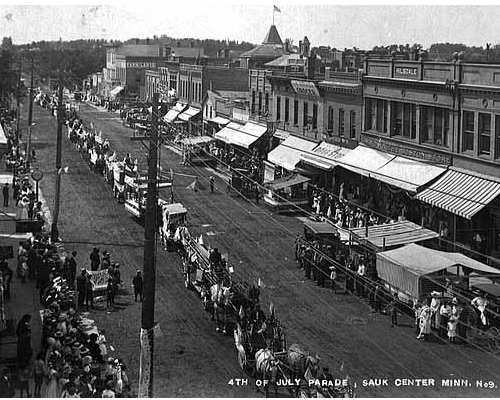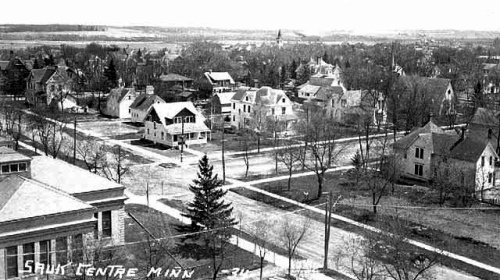I made a vaguely dismissive comment about Sinclair Lewis in the comments to the Halldór Laxness post, questioning whether he deserved a Nobel Prize. But not long afterwards, in reference to the Wall Street vs. Main Street theme that has been running in US elections, a journalist mentioned the novel Main Street by Sinclair Lewis. Hang on a minute, I thought, that doesn’t sound right… and about 30 seconds of research revealed that I hadn’t been thinking of Sinclair Lewis at all. I was thinking of Wyndham Lewis. A really quite different writer.

So I read Main Street. And actually, it was surprising how often it seemed relevant to the kind of culture war rhetoric that has been coming up on the campaign trail. Especially for a book published in 1920. There was even an argument about whether or not it’s patriotic to pay taxes.
The book is about Carol, a liberal, bookish girl who is non-specifically ‘artistic’; she marries a country doctor and moves with him to his home town of Gopher Prairie, Minnesota, which is part of what Sarah Palin would call ‘the real America’. She goes there with vague but idealistic hopes of improving the town, with beauty or culture or architecture, which founder in the face of the gossipy, judgemental, conservative, hypocritical, prejudiced, narrow-minded, coarse, prudish and generally unsympathetic locals.

It is a fiercely satirical portrayal of small-town America which confirms all the worst fears of an arugula-eating, latte-drinking liberal like myself*. Lewis came from a small town himself (Sauk Centre, Minnesota), so he was writing from experience, although it does seem possible that he had a few biases of his own.
This is Carol’s first Gopher Prairie party:
Sam Clark had been talking to Carol about motor cars, but he felt his duties as host. While he droned, his brows popped up and down. He interrupted himself, “Must stir ’em up.” He worried at his wife, “Don’t you think I better stir ’em up?” He shouldered into the center of the room, and cried:
“Let’s have some stunts, folks.”
“Yes, let’s!” shrieked Juanita Haydock.
“Say, Dave, give us that stunt about the Norwegian catching a hen.”
“You bet; that’s a slick stunt; do that, Dave!” cheered Chet Dashaway.
Mr. Dave Dyer obliged.
All the guests moved their lips in anticipation of being called on for their own stunts.
“Ella, come on and recite ‘Old Sweetheart of Mine,’ for us,” demanded Sam.
Miss Ella Stowbody, the spinster daughter of the Ionic bank, scratched her dry palms and blushed.
“Oh, you don’t want to hear that old thing again.”
“Sure we do! You bet!” asserted Sam.
“My voice is in terrible shape tonight.”
“Tut! Come on!”
Sam loudly explained to Carol, “Ella is our shark at elocuting. She’s had professional training. She studied singing and oratory and dramatic art and shorthand for a year, in Milwaukee.”
Miss Stowbody was reciting. As encore to “An Old Sweetheart of Mine,” she gave a peculiarly optimistic poem regarding the value of smiles.
There were four other stunts: one Jewish, one Irish, one juvenile, and Nat Hicks’s parody of Mark Antony’s funeral oration.
During the winter Carol was to hear Dave Dyer’s hen-catching impersonation seven times, “An Old Sweetheart of Mine” nine times, the Jewish story and the funeral oration twice; but now she was ardent and, because she did so want to be happy and simple-hearted, she was as disappointed as the others when the stunts were finished, and the party instantly sank back into coma.
The scathing portrayal of Gopher Prairie is pretty relentless, but the book is more than just 400 pages of mocking the rubes. Carol is hardly perfect herself: she’s just a touch too highly-strung and prickly. And her husband may be more interested in motor cars and land deals than Yeats, but he is shown to be a hard-working, resourceful and skilful doctor.
Mainly, though, I thought it was an enjoyable read: I really got caught up in it as a story, which isn’t true of everything I read these days. The details, both social and physical, are well observed; it’s funny; it has just enough of the soap opera about it to keep me turning the pages. Good stuff.
*Actually, that’s not true, I can’t see the point of latte. But I don’t suppose my organic, single estate coffee grown on a Guatemalan co-operative wins me any Real America points either. And not being American can’t help, of course.
» The pictures of Sauk Centre are from the enormous collection you can find at the Minnesota Historical Society website.
The reason I quoted such a long passage is that it’s out of copyright, so I could just copy and paste it from the Electronic Text Center at the University of Virginia LIbrary.
